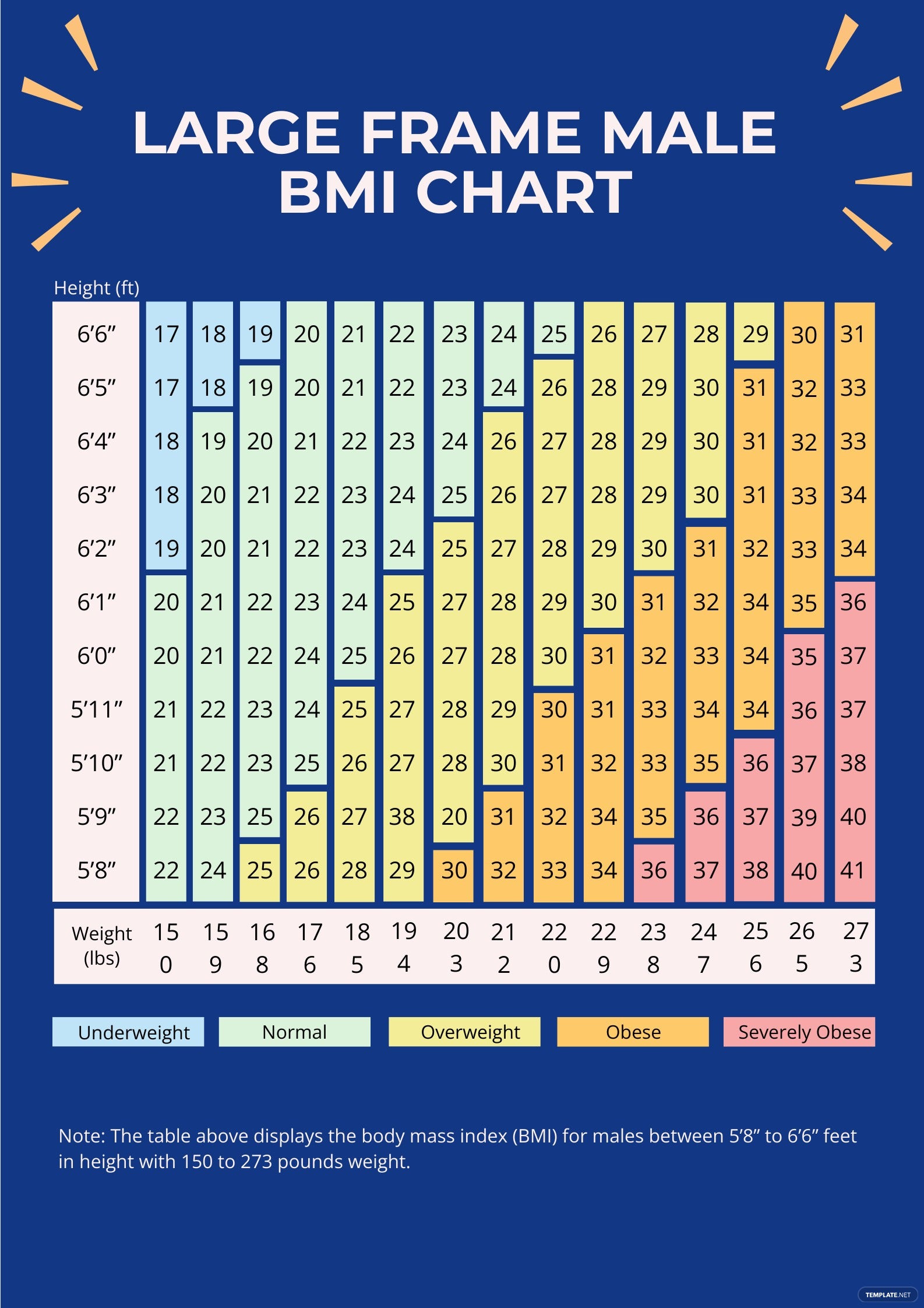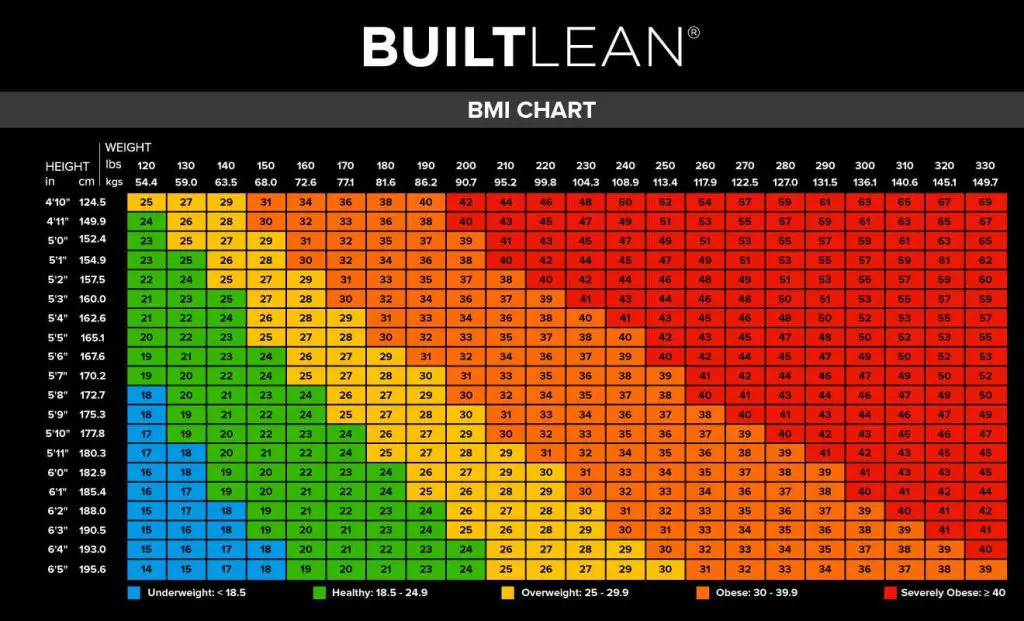BMI, or Body Mass Index, is a measure used to determine if a male is at a healthy weight. It takes into account a person’s height and weight to calculate how much body fat they have. A BMI of 18.5-24.9 is considered healthy for males. For males, a BMI of 25-29.9 is considered to be overweight, and a score of 30 or higher is considered obese. Being overweight or obese can increase a person’s risk of developing serious health problems, such as heart disease, stroke, diabetes and some types of cancer.
In order to achieve and maintain a healthy BMI, males should strive to engage in regular physical activity and focus on eating a balanced diet. Eating a variety of nutritious foods, such as fruits and vegetables, lean proteins and whole grains, can help to provide the body with the nutrients it needs. Males should also be mindful of their portion sizes and limit their consumption of foods that are high in saturated fat, sugar and salt. Reducing sugary drinks, such as soda and juice, and avoiding processed foods is also recommended. Monitoring BMI can help males to track their progress and ensure they are maintaining a healthy weight. Eating healthy and engaging in regular physical activity can help males to achieve and maintain a healthy BMI and reduce their risk of developing chronic health conditions.
bmi chart males

A Body Mass Index (BMI) chart for males is a useful tool to determine a male’s healthy weight range. It consists of a range of heights and corresponding weights, which can be used to calculate a male’s BMI. The higher a male’s BMI, the greater his risk for health issues. The BMI chart for males provides a reliable assessment for men aged between 18 and 65 years. To accurately assess a male’s BMI, the chart should be used in combination with other factors such as age, body composition, and physical activity levels.
Generally, a BMI between 18.5 and 24.9 is considered a healthy weight range for males. If a male’s BMI is below 18.5, he may be underweight and should consider a healthful diet and monitored physical activity to reach a healthier weight. If a male’s BMI is above 24.9, he may be overweight and should consider a balanced diet and monitored physical activity to reach a healthier weight. It is important to remember that a BMI chart is not a perfect tool to measure a male’s health. It is merely a guideline to determine a healthy weight range. Other factors such as body composition and physical activity should be taken into consideration when assessing a male’s health. It is also important to note that BMI is only one of the many indicators of a male’s health. Factors such as blood pressure, cholesterol, and blood sugar levels should also be taken into account when assessing a male’s overall health. The BMI chart for males is simply a tool to help individuals determine a healthy weight range.
Does the BMI chart really that accurate?
But is the BMI chart really that accurate? Well, this is a difficult question to answer. On one hand, the BMI chart is a good way to determine if someone is a healthy weight. On the other hand, BMI does not take into account individual factors such as age, muscle mass, and body type. Therefore, a person with a high BMI might actually be quite healthy, while a person with a low BMI could be underweight and unhealthy. It is important to remember that the BMI chart should be used as a guideline, not a definitive measure of health.
A doctor should be consulted when making any decisions regarding weight and health. The BMI chart can be useful in some cases, but it should not be taken as a definitive measure of health. It is important to consider other factors, such as age and body type, when trying to determine if someone is overweight or underweight. Additionally, it is important to consult a doctor when making any decisions related to health and weight.
How do you calculate BMI on a calculator?
Calculating BMI on a calculator is easy and straightforward. To calculate BMI for males, you need to know your weight in kilograms and height in meters. First, divide your weight in kilograms by your height in meters squared. Then, multiply your answer by a conversion factor of 703. Your BMI is the result of this calculation. For example, if your weight is 80 kilos and your height is 1.8 meters, you would divide 80 by 3.24, which is 24.7. Then, multiply that result by 703, which equals 176.1. This is your BMI. BMI stands for Body Mass Index and is used to assess a person’s body composition. It is an important factor in determining overall health, and can help you decide if lifestyle changes or weight management is necessary. Though BMI is a useful indicator of health, it is not a perfect measure. A BMI of 25 or higher is considered overweight, but it does not take into account factors such as age, muscle mass, and body fat percentage. Therefore, it’s important to consider other factors when trying to understand your overall health.
What is the normal BMI for a male?
The Body Mass Index (BMI) is a measure of a person’s weight in relation to their height. It is used to determine if a person is in a healthy weight range for their height. For males, a normal BMI is between 18.5 and 24.9. A BMI below 18.5 is considered underweight, while a BMI above 24.9 is considered overweight. It is important to note that BMI is not an exact measure of body fat and other factors should be taken into account when assessing a person’s health.
A person’s age, muscle mass and gender can all affect their BMI. Generally, the older a person is, the higher their BMI should be in order to be considered healthy. Similarly, a person with a higher muscle mass may have a higher BMI than the average for their height, but still be within the normal range. For males, BMI is generally higher than it is for females. This is because men often have a higher muscle mass than women and therefore weigh more. A healthy BMI for a male is still within the range of 18.5 to 24.9, however. It is also important to note that BMI is not an exact measure of health, and other factors should be taken into consideration when assessing a person’s overall health. Eating a balanced diet and exercising regularly are important for maintaining good health, regardless of BMI.
How to calculate BMI Calculator?
Calculating your body mass index (BMI) is an important part of assessing your overall health and wellbeing. For males, there is a specific calculation for BMI that should be used. To calculate your BMI, you need to know your weight in kilograms and your height in centimeters. Once you have these two values, you can use this formula: BMI = weight (in kg) divided by height (in meters) squared. For example, if a male weighs 80 kilograms and is 180 centimeters tall, then his BMI can be calculated as: 80 / (1.8 x 1.8) = 24.7.
It is important to remember that BMI is only an estimate and is not an exact measure of body fat. It is also best to discuss your BMI results with a doctor or other health professional to get a more accurate assessment of your health and wellbeing. Finally, males should keep in mind that a BMI of 25 or more is considered overweight, and a BMI of 30 or more is considered obese. Having a high BMI increases the risk for developing health problems such as heart disease, diabetes, stroke, and certain types of cancer.
avg bmi for male

The average BMI for males is generally considered to be within the range of 18.5 to 24.9. This range is known as the “healthy weight range” for adults of any gender. BMI is a measure of body fat based on height and weight. It is used to determine whether someone is of a healthy weight for their height. BMI can also be used to indicate whether a person is underweight, overweight, or obese.
A BMI of below 18.5 is considered underweight, a BMI of 25 to 29.9 is considered overweight, and a BMI of 30 or greater is considered obese. People with a higher BMI than the average for men may be at greater risk for health problems such as high blood pressure, heart disease, stroke, and type 2 diabetes. Conversely, people with a lower BMI than the average may be at greater risk for osteoporosis and other bone conditions. It is important to remember that BMI is just one measure of health. Other factors such as age, activity level, lifestyle, and overall health should also be taken into account when determining a person’s health status. Additionally, BMI does not measure body fat directly. Therefore, it is not a perfect indicator of health. In conclusion, the average BMI for males is generally considered to be in the range of 18.5 to 24.9. However, it is important to remember that BMI is just one indicator of health and other factors such as age, activity level, lifestyle, and overall health should also be taken into consideration.
Is a BMI considered overweight?
Body Mass Index (BMI) is a measure used to assess the weight of a person. It is calculated by dividing a person’s weight in kilograms by the square of his height in meters. For males, a BMI of 25 or higher is considered as overweight. A BMI of 18.5 or less is regarded as underweight, and a BMI between 18.5 and 25 is considered to be a healthy weight. Overweight males are at risk of developing chronic medical conditions such as heart disease, stroke, diabetes and some forms of cancer.
Therefore, it is important for males to maintain a healthy weight. Various lifestyle changes can help maintain a healthy BMI. These include avoiding unhealthy foods and drinks, exercising regularly, and reducing stress. Regular health check-ups are necessary to monitor the progress and any changes in weight. By maintaining a healthy BMI, males can reduce the risk of developing many chronic conditions, and lead a healthier and happier life.
What is good BMI for men over 50?
BMI (Body Mass Index) is a measure of a person’s body fat based on their height and weight. For men over the age of 50, it is recommended that their BMI should be in the range of 18.5 and 24.9. This is considered a healthy range and is often used to identify people who are at risk of health problems due to being overweight or underweight. To calculate your BMI you’ll need to know your height and weight in either kilograms or pounds. Once you have this information, you can use a BMI calculator to figure out your BMI.
If your BMI is higher than 24.9 or lower than 18.5, it is a sign that you could be at risk for developing obesity or even malnutrition. Maintaining a healthy BMI is important for men over 50 in order to reduce the risk of developing chronic conditions such as heart disease, diabetes, and some types of cancer. Eating a balanced diet and engaging in regular physical activity can help men over 50 achieve and maintain a healthy BMI. It is also important for men over 50 to consult with their doctor about their weight and BMI. This can help them to determine whether further action is necessary in order to reach a healthy BMI. It is also important to be aware of other risk factors such as cholesterol and blood pressure, which can also be affected by BMI. Overall, it is recommended that men over 50 maintain their BMI between 18.5 and 24.9 in order to reduce their risk of developing chronic health conditions. Eating a balanced diet and engaging in regular physical activity can help men over 50 stay at a healthy BMI. Consulting with your doctor can also help you to determine whether further action is necessary.
How do you calculate BMI for men?
Calculating Body Mass Index (BMI) for men is a relatively simple process. It is a measure of a person’s body fat, based on their height and weight. To begin, you need to measure your height in metres and your weight in kilograms. Once you have these two measurements, you can calculate your BMI using the following formula: BMI = weight in kilograms divided by height in metres squared. This calculation will give you a number that is your BMI.
BMI readings are generally divided into four categories: Underweight (less than 18.5), Healthy Weight (18.5-24.9), Overweight (25-29.9), and Obese (30 or more). Knowing your BMI can help you assess your risk of health problems associated with being overweight or obese. It is important to remember that BMI is just a calculation and should not be taken as a definitive measure of health. Genetic factors and lifestyle choices can also play a role in your health. It is recommended that you speak with a doctor if you are worried about your weight or body fat levels. Overall, calculating BMI for men is an easy process that can provide useful information about your health and wellbeing. However, it can only give you a rough estimate and should not be solely relied upon. It is a good idea to talk to your doctor for a professional opinion.
What is the average weight of a healthy male?
The average weight of a healthy male in terms of Body Mass Index (BMI) can vary depending on a person’s height, age and gender. Generally, a healthy BMI for men is considered to be between 18.5 and 24.9, with 24.9 being the ideal weight. An average healthy male of 5’9″ in height should weigh between 145 and 196 pounds. Those 5’10” should weigh between 149 and 202 pounds, and those 6’0″ should weigh between 173 and 229 pounds. The average weight of a healthy male can also be determined by his Body Fat Percentage (BFP).
A male’s BFP should be between 7 and 24 percent. This range allows for a relatively lean body, enough to have visible abs and maintain proper health. The average weight for a healthy male also depends on his body type and genetics. Some men are naturally more muscular than others, and their ideal weight may be slightly above the range given. In conclusion, although there is a general range for what is considered a healthy weight for a male, the exact weight can vary depending on the individual. A combination of BMI, BFP, height, age, and body type should be taken into consideration when determining the average weight of a healthy male.







